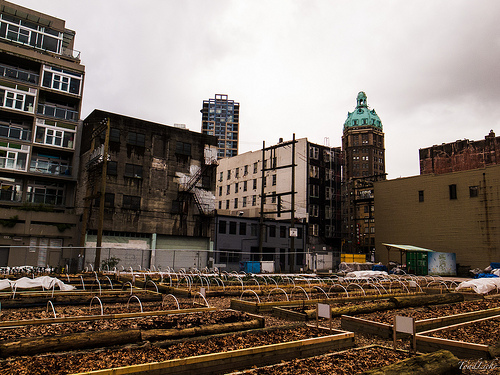The role of urban farms in changing environmental thinking

Living in California, I am fortunate to get a lot of produce from local sources. It's rewarding to support the local economy, feels healthier, and has a reputation for being more environmentally friendly due to cutting carbon emissions associated with transporting all that food from somewhere else. Only, there's research now that shows it doesn't really cut carbon emissions that much.
So, does that mean we shouldn't feel all that guilty about importing food from around the world? Maybe. But I argue that local food is good for the environment in ways that go beyond basic measuring tactics like carbon emissions per piece.
I think the real issue is community. The thought process behind environmentalism, I think, is that we are connected in a web of interrelatedness with everything around us and that what we do has real effect to the Earth rather than happening in a vacuum. And that's a concept that isn't front and center in most American cities.
It's easy to think that money comes from ATMs, food comes from the store and everyone in the world has a car they use all the time- these are things that seem true when you're a kid. And while we all objectively know as we get older that those are not true things, much of our society is based around a global flow of goods, especially food.
When everything comes from some distant land and we don't see where our garbage goes beyond trash pickup, it's hard to conceptualize making a difference. If your food, however, came from a farm nearby, you start to think about it as something close, something you can touch and smell before it's in your house, and, most importantly, something you are connected to and responsible for.
Enter Peaceful Belly, a farm near Boise that is not right IN the city, but is very close and thinks of itself as an "urban-serving farm." Excellent. Their entire message is built around community and the idea that they create food for people nearby. They have a thriving CSA. And people respond by understanding that their food is coming from their neighbors, what they put back into the water supply is going to help grow their food and that they are, beyond the supermarket financial exchange, responsible for their food.
This is the shift in thinking that will lead to better environmental choices.
Image courtesy of ToadLickr via flickr

0 comments